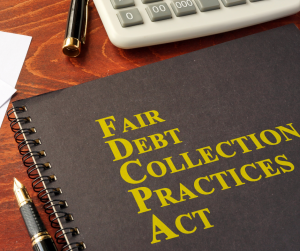The Fair Debt Collection Practices Act (FDCPA) protects debtors from abusive, unfair and deceptive debt collection practices that pressure and intimidate debtors. Under this law, debtors are entitled to respectful treatment and privacy from third-party debt collectors. Below, the attorneys at Grossbart Portney & Rosenberg, P.A. outline some of the debt collection practices that are illegal under the FDCPA.

The Fair Debt Collection Practices Act protects debtors from illegal debt collection practices
What Is the FDCPA?
Enacted in 2010, the FDCPA grants protection to debtors from abusive debt collection practices. The FDCPA regulates when, how and how often a third-party debt collector may legally contact you. It also places limitations on who else the debt collector can contact regarding your debt. If a debt collector violates the FDCPA, the debtor can sue them in state or federal court for damages in legal fees within one year of the violation.
When am I Protected by the FDCPA?
The FDCPA limits the actions of third-party debt collectors, such as a debt collection agency, who are attempting to collect debts on behalf of another person or entity. Debts such as credit card debt, medical bills, student loans, mortgages and other household debts are examples of debts that may be pursued by third-party debt collectors.
The FDCPA does not protect a debtor from actions taken while trying to collect a personal debt. For example, if you have outstanding payments owed to a construction company, and the owner of the company calls you to collect that debt, the owner of the company is not a debt collector limited by the FDCPA.
Is My Debt Collector Acting Illegally?
If a debt collector is performing any of the following actions, they may be violating the FDCPA.
Contacting You at Odd Hours
The FDCPA limits when, what time and how frequently a debt collector can contact you. Debt collectors are not allowed to contact you before 8 a.m. or after 9 p.m.
Showing Up at Your Place of Employment
Debt collectors are not allowed to come to your workplace, as the act also protects against publicizing debt. They may, however, contact you over the phone at work, as long as they do not reveal to your coworkers that they are debt collectors or disclose the purpose of the call.
If you tell the debt collector verbally, or in writing, to stop contacting you at your place of employment, the collector is no longer allowed to call that number.
Harassing You
The FDCPA also protects against harassment from debt collectors. Harassment from a debt collector may include:
- Threats of violence
- Publishing information about you or the debt
- Lying to you
- Empty threats of a lawsuit
- Abusive or obscene language
Attempting to or Threatening to Arrest You
You cannot be arrested by a debt collector for a debt that you owe.
An arrest warrant for outstanding debt only comes as a result of a court order. If a debt collector sues over outstanding debt and you fail to appear in court, you may lose and be ordered to pay the outstanding debt. If that court order is denied, then the debt collector may pursue you with an arrest warrant.
How Can a Debt Collector Legally Contact Me?
It’s important to understand the legal ways in which a debt collector can contact and interact with you regarding outstanding debt. The following actions are legal under the FDCPA.
Seek Payment on an Expired Debt
Unsecured debt, such as credit card debt and medical bills, have statutes of limitations. Once this date passes, the debt is considered “expired” and you can no longer be sued for payment. However, a debt collector can still contact you to seek payment on these expired debts.
Pressure You
Debt collectors are allowed to pressure you. This can include calling daily, frequent letters and talking seriously about pursuing a lawsuit. These are all legal actions as long as they do not include harassment.
Sue for Payment on a Debt
Often the last resort in debt collection, a debt collector can bring a lawsuit against you for payment on a debt.
Sell Your Debt
If a collector is unable to collect your debt, they may ‘sell’ your debt to another third-party debt collector. If one debt collector no longer contacts you about a particular outstanding debt, a new one may start to reach out. If you are able to pay off your debt in full, be sure to have proof in writing so that you can inform new debt collectors and stop any future collection calls.
Negotiate What You Owe
Debt collectors usually have large profit margins on debts that they purchase. This allows them to have flexibility in negotiating payments from you. It may be possible for you to settle on a smaller amount owed. Be sure to obtain this agreement in writing.
Learn More About the FDCPA and Protection from Illegal Debt Collection Practices with Our Team of Attorneys
The Consumer Financial Protection Bureau reports that one-in-four consumers contacted by a debt collector feels threatened. If you believe that you are a victim of illegal debt collection practices, we are here to help you take action. You have the right to sue a debt collector within one year from the date an FDCPA rule was violated. To discuss your case further and understand your rights under the FDCPA, contact one of the experienced attorneys at Grossbart Portney & Rosenberg today.
